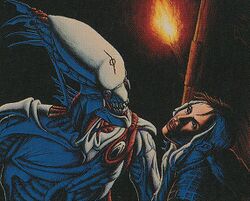Sacrifice at Koilos

|
Nickname “Not a bad name, I’d say.”
|
| Sacrifice at Koilos | |||||
|---|---|---|---|---|---|
| Information | |||||
| Era | The Thaw | ||||
| Date | c. 3245 AR | ||||
| Location | Koilos, New Argive, Terisian Isles, Dominaria | ||||
| Sets | Urza's Saga | ||||
| Characters | Gix, Ratepe, Urza, Xantcha | ||||
| Result |
| ||||
| Timeline | |||||
| |||||
The Sacrifice at Koilos was an event with significant effects on the history of Dominaria.
Description
For a year, Xantcha and Ratepe had helped Urza in the creation of "screaming spiders" capable of killing Phyrexians while leaving non-Phyrexians unharmed. During the Festival of Fruits, these artifacts were set off across Dominaria, including in Pincar City, where Gix had been keeping his lair. After a short fight with Urza, Gix escaped Efuan Pincar and traveled across the sea to Koilos. Urza, Xantcha, and Ratepe followed the praetor, and Urza went alone into the cave, ordering Xantcha and Ratepe to wait outside. At first, it seemed as if either could win, but then, Gix started gaining the upper hand in the battle by negating the power in Urza's powerstones. Xantcha and Ratepe knew what they had to do if Urza was to survive and Dominaria was to stand a slim chance of surviving Phyrexia's invasion — they had to sacrifice themselves to stop Gix. Together, they reached into the beam that disrupted Urza's powers, breaking Gix's concentration and restoring the power to Urza's powerstones. Although the beam was powerful enough to also kill both Xantcha and Ratepe outright, their sacrifice gave Urza the chance to kill the praetor, leaving the planeswalker as the only survivor. Upset at the loss of his "brother" and his friend, Urza resolved to no longer be reactive to the Phyrexian threat, and instead start taking the lead in the War with Phyrexia. This would lead to the Founding of the Tolarian Academy 40 years later.[1]
